Why do people lie? Why does truth always seem so inadequate to their situations?
- Some seek a competitive advantage over a rival.
- Others nervously view their success through the lens of an "impostor syndrome."
- Some are meticulously trying to compartmentalize their lives.
- Others are hoping to start their lives over in a location where no one knows them.
- Some are trying to hide a secret which could make them vulnerable to blackmail.
- Others have changed their story so many times that they no longer know where the truth lies.
For those with fertile imaginations and shifting self images, finding and following a moral compass is an exquisite challenge. When push comes to shove, all the moral teachings one has absorbed during a lifetime can disappear in a moment of self-serving rationalization.
- Sir Walter Scott warned "Oh what a tangled web we weave, when first we practise to deceive!"
- Leonard H. Courtney is famous for his statement that "Facts are facts, and although we may quote one to another with a chuckle, the words of the Wise Statesman, 'Lies -- damn lies -- and statistics,' still there are some easy figures the simplest must understand, and the astutest cannot wriggle out of."
The Reverend Martin Luther King Jr. famously claimed that "The arc of the moral universe is long, but it bends toward justice." Claiming the moral high ground is all well and good, but morals quickly fly out the window whenever a profit motive is involved.
Ironically, the ability to successfully float a lie can depend on the socioeconomic circles in which one travels. In 2012, a study published in the Proceedings of the National Academy of Sciences of the United States of America demonstrated that people with a tendency to engage in less ethical behavior often have the most money, the most income, the best education and the most prestigious jobs. Differences in ethical behavior might be partially explained by a more favorable attitude toward greed among those who perceived themselves as members of an "upper class" (think of people like the Koch Brothers, Mitt Romney or Dick Cheney).
Not surprisingly, the study's results were consistent "across age, gender, ethnicity, religion and political orientation of the participants." It found that:
- Wealthy people were more likely to engage in unethical behavior than their poorer counterparts.
- Those who considered themselves members of an "upper class" were more likely to take valued items from others.
- Wealthy people showed a greater willingness to lie during negotiations and cheat to increase their chances of winning a prize.
- "Upper-class" drivers were more likely to cut off other drivers (as well as pedestrians at crosswalks).
Although he did not appear in George Bernard Shaw's original script for Pygmalion (1912), the playwright added the character of Count Aristid Karpathy to the 1938 screen adaptation which starred Leslie Howard as Professor Harold Higgins and Wendy Hiller as Eliza Doolittle. In 1956, when My Fair Lady took Broadway by storm, Professor Zoltan Karpathy (a former student of Henry Higgins), had not only become a rival phonetician, but an expert blackmailer.
Two recent Bay area premieres showed that, while Americans like to think of themselves as a classless society, the socioeconomic advantages of the 1 percent (as opposed to the other 99 percent) cannot be ignored. Whether one attributes the ability to rise above certain painful secrets to white privilege or having risen above one's past, at some point the truth can rise up and bite a person in the ass.
* * * * * * * * * *
As in Shaw's Pygmalion, dialect plays a critical role in David Lindsay-Abaire's heart-rending dramedy, Good People. Set in South Boston (where the playwright grew up), it captures the sound of New Englanders who have been stuck in a pocket of economic depression for years with little chance of finding a better life. For these blue-collar workers, upward mobility isn't merely a luxury, it's a hopeless fantasy.
As the play begins, its protagonist, a stressed-out, middle-aged cashier at a Dollar Store, is about to lose her job. A single mother, Margaret Walsh (Amy Resnick) is chronically late for work due to problems providing home care for Joyce, her 30-year-old, developmentally disabled daughter. Even though Margie's young supervisor, Stevie (Ben Euphrat), has known her for his entire life he has no choice but to act on his boss's orders.
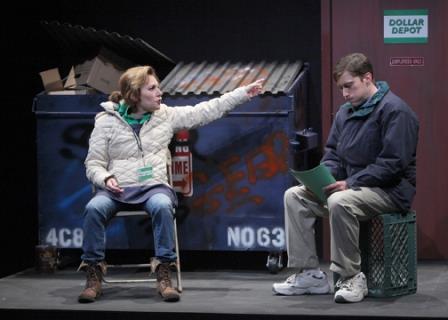
Margie (Amy Resnick) and Stevie (Ben Euphrat) in Good People
(Photo by: Ed Smith)
Back at home, when Margie commiserates with her friends, Jean (the hilarious Jamie Jones) mentions having bumped into their old friend, Mikey (Mark Anderson Phillips), a former Southie who managed to get into college, get a medical degree, and is now running a fertility clinic. As Jean urges her financially-stressed friend to ask the good doctor if he has any work available, the topic of Joyce's paternity enters the discussion.
Margie and Mikey had a brief fling during the summer before he left for college, a period in which Joyce (who has always been described as a "preemie") might have been conceived. When Mike fails to return her phone calls, Margie decides to visit his office without an appointment. Although she severely tests the patience of the doctor's sexy Dominican receptionist, her gamble succeeds in bringing Mike face to face with his old girlfriend.
What follows is a deftly-written cat-and-mouse game as Margie tries to be nice, hoping that she can appeal to the side of Mike that understands what "good people" do to help their friends who are in need. But when Mike keeps dodging her requests, she starts to needle him about having turned into a "lace curtain Irish" instead of remaining a true "Southie" and congratulates him on his successful transformation. Soon Margie has invited herself to a birthday party Mike's wife is hosting at their home in Chestnut Hill in the hope that one of Mike's friends might be able to offer her a job.
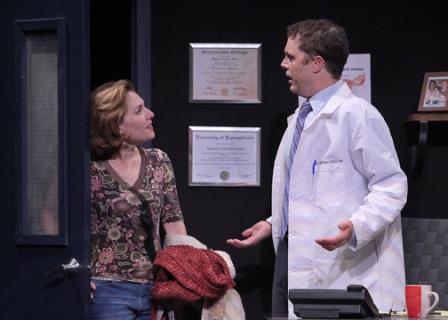
Amy Resnick and Mark Anderson Phillips in Good People
(Photo by: Ed Smith)
Several days later, when Mike calls to inform Margie that the party has been cancelled due to his daughter's illness, she interprets his call as an attempt to blow her off. With typical Southie arrogance, she decides to show up at his house anyway and crash the party. By this time, Margie's situation has grown more financially tenuous. As the old saying goes: "Desperate times require desperate measures."
One of the reasons Margie lost her position at the Dollar Store was because her landlady, Dottie (Anne Darragh), was always late showing up for her part-time job as Joyce's caretaker. Despite her fondness for Joyce, Dottie is feeling pressure to rent Margie's flat to her son. Meanwhile, Jean is urging Margie to tell her old boyfriend that Joyce might be his child.
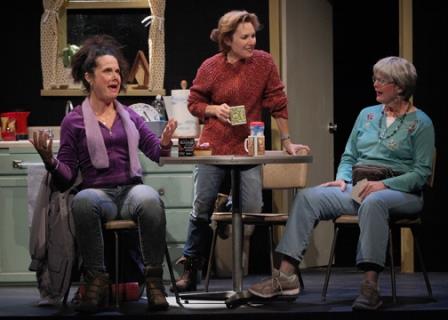
Jamie Jones, Amy Resnick, and Anne Darragh in Good People
(Photo by: Ed Smith)
By the time Margie rides the MBTA out to Chestnut Hill and is welcomed by Mike's African-American wife (who assumed that Margie was one of the catering staff), the stage has been set for an awkward confrontation. At Kate's urging, Margie (who quickly realizes that Mikey married his boss's daughter) starts to reveal moments from Mikey's past that he has either glossed over or conveniently managed to forget.
As Mike grows angrier and more defensive, it becomes obvious that Margie has opened up a huge can of truly disgusting worms. The audience witnesses an increasingly desperate woman trying to pull off a lie that she doesn't really believe. By the time Margie leaves Chestnut Hill, her hopes of finding any employment are dashed, Mike's marriage is under further strain, and it seems as if no good deed -- not even the gift of one of Dottie's tacky, home-made rabbit dolls -- will go unpunished.

ZZ Moor, Amy Resnick, and Mark Anderson Phillips
in a scene from Good People (Photo by: Ed Smith)
The Marin Theatre Company's production of Good People, which was cleverly directed by Tracy Young, gave Amy Resnick an artistic triumph in one of her juiciest roles in recent seasons. While Mark Anderson Phillips provided a keen foil, it was ZZ Moor (as Mike's more sophisticated wife, Kate) who was able to see through Margie's desperate ploy.
Jamie Jones, Anne Darragh, and Ben Euphrat provided plenty of comic relief as Margie's unsophisticated "Southie" friends for whom their church's regular bingo game offers solace, companionship and rare moments of escape from the overwhelming disappointment of their daily lives.
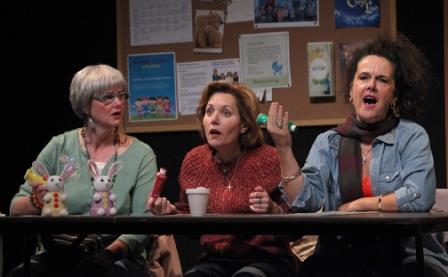
Anne Darragh, Amy Resnick, and Jamie Jones in Good People
(Photo by: Ed Smith)
Kudos to MTC's dialect coach, Lynne Soffer, for an outstanding job capturing the sound of Southie tawk, as well as to Nina Ball, whose skeletal sets (combined with Heidi Leigh Hanson's telling costume designs) underline the class differences between residents of Chestnut Hill and South Boston. Here's the trailer:
* * * * * * * * * *
Down in Mountain View, TheatreWorks presented the Bay area premiere of Other Desert Cities in a co-production with the Old Globe Theatre of San Diego. Written by Jon Robin Baitz (who did such beautiful work on Brothers & Sisters) and directed by Richard Seer, the play focuses on a family of wealthy Republican dinosaurs living in Palm Springs.
Over the years, Polly and Lyman Wyeth have socialized with the Reagans, the Annenbergs, and others of their ilk. Lyman (James Sutorius) was a successful screen actor while Polly (Kandis Chappell) and her sister, Silda (Julia Brothers), enjoyed artistic and commercial success writing romantic comedies for MGM. Unlike Polly and Lyman, Silda has always had liberal leanings. Since leaving rehab, she's been living with her older sister and brother-in-law on an indefinite guest basis.
The play begins during Christmas 2004, a time when the United States was fighting wars in both Iraq and Afghanistan, Neocons had taken over the Republican party, and the social and political power of the Wyeths had sharply diminished. It's also the first time in six years that Polly's adult children will be home for Christmas.

Brooke (Kate Turnbull) and her brother, Tripp (Rod Brogan),
in a scene from Other Desert Cities (Photo by: Mark Kitaoka)
Well, not all of her children. Tripp (Rod Brogan) is a womanizing television executive who produces game shows and only seems interested in having a good time. His older sister, Brooke (Kate Turnbull), has flown in from her home in Sag Harbor, New York following a recent hospitalization for depression. Their oldest son, Harry, committed suicide many years ago after his involvement in a radical underground movement protesting the Vietnam War led to some unintentional deaths.
The big news is that Brooke has penned a tell-all memoir which she wants her parents to read before it is published in a few months. Proud to have used the writing process as a therapeutic tool with which to relate how Harry's death impacted her life (he died when they were both teenagers), she's sure that the details of her personal life will be of interest to readers of her novel. However, Brooke doesn't know the real story of how and why Harry disappeared from her life when she was so young and he was her closest and best friend.
Part of the problem with the Wyeth family is that Brooke has always seen her mother as a stereotypical Republican ice queen, unable to show any emotion or be truly supportive of her daughter's writing efforts. Brooke's father has always seemed weak and ineffectual. Perhaps that's why 3,000 miles has been a healthy distance to keep between herself and her parents.
After Polly warns that publishing a tell-all memoir could cause a severe rupture within the Wyeth family, Brooke's parents read the manuscript and realize that they have no choice but to tell their daughter the ugly truth. In all honesty, they had meant to tell Brooke what happened to Harry when she reached an age where she could better understand the events of the past. Somehow, that moment never seemed to materialize and now, faced with a Brooke's publishing deadline, they have no wiggle room left.
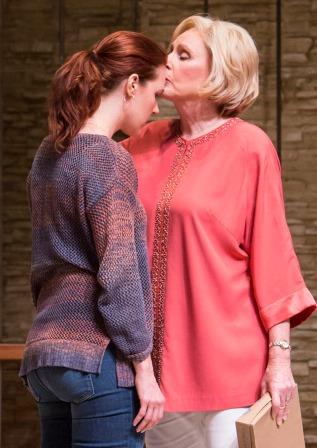
Polly (Kandis Chappell) kisses her daughter, Brooke (Kate Turnbull)
in a scene from Other Desert Cities (Photo by: Tracy Martin)
Surprisingly, it is not Polly who drives the decision to reopen old wounds but Lyman (who simply can't bear the strain of continuing to live another day under the weight of such a heinous family lie). With her usual icy self-control, Polly asks everyone in the room to sit down before she details what happened to her errant son, quietly marveling at how easy it was for her to use her privileged status as a wealthy white woman to pull off Harry's great disappearing act.
Polly's shocking revelations are handled with the kind of masterful storytelling that Baitz used to keep fans of Brothers & Sisters glued to their television sets. Yet, because of his rare sensitivity, the final scene (in which Brooke finds a personal grace and redemption of sorts) was exquisitely written and beautifully performed by Kate Turnbull.

Silda (Julia Brothers) and Polly (Kandis Chappell) are sisters
with radically different political leanings in Other Desert Cities
(Photo by: Mark Kitaoka)
While some may see Baitz's drama as a tug-of-war between a family's generations -- or even between two sisters of politically opposite persuasions -- the bottom line is that Other Desert Cities is about the emotional and psychological toll suffered by those who choose to live a lie. Anyone who has spent years in the closet will find the way Baitz has shaped an older generation's hypocrisy to be of particular interest. Although the ensemble cast was uniformly excellent, special credit is due to Alexander Dodge, whose stylish unit set captures the wealthy lifestyle that old California money can buy in Palm Springs.
To read more of George Heymont go to My Cultural Landscape
